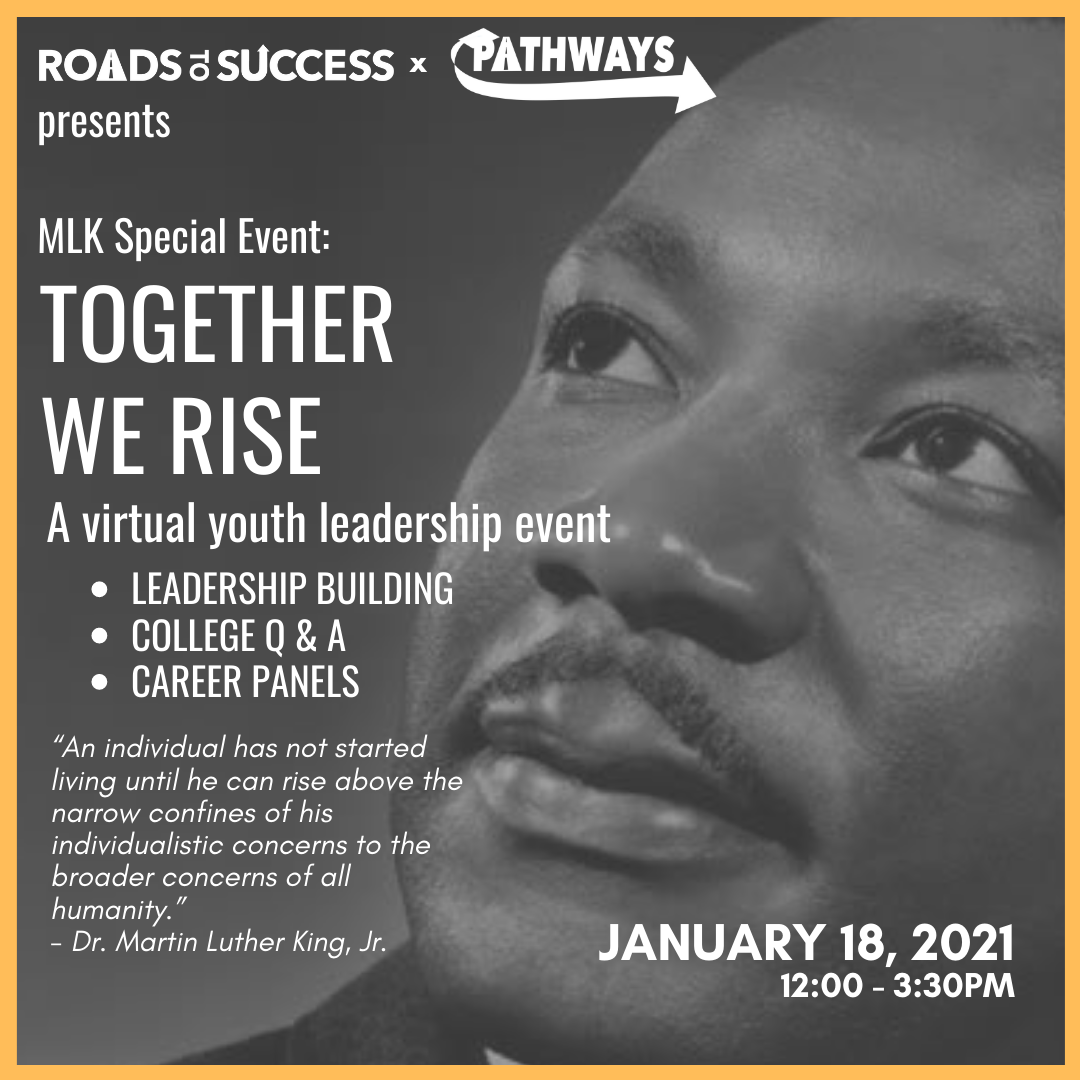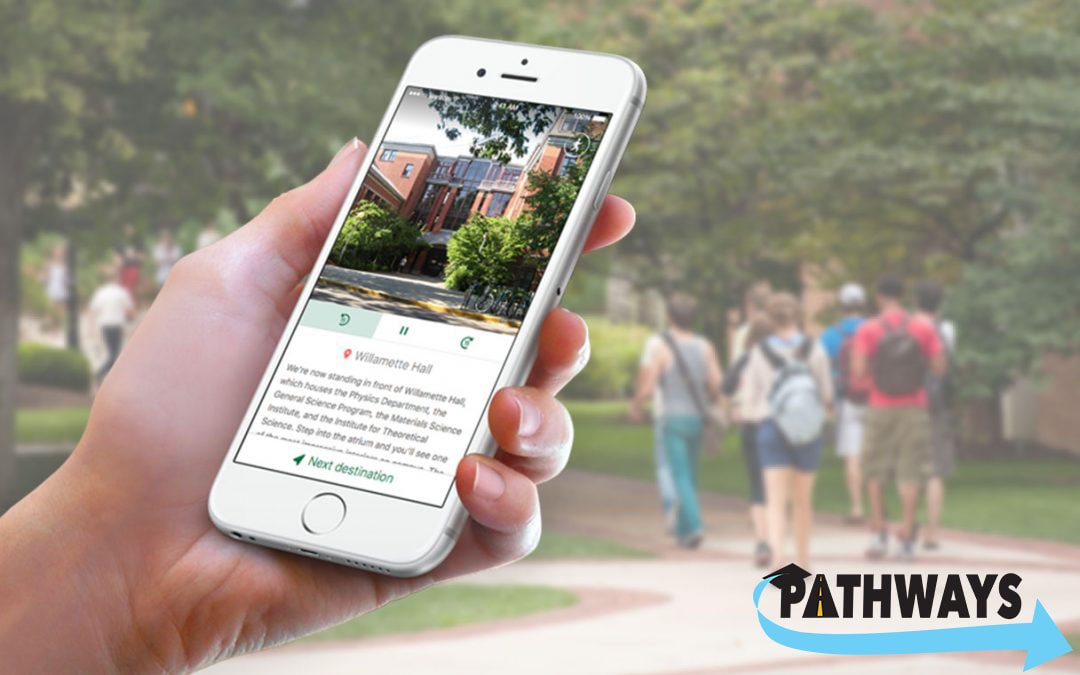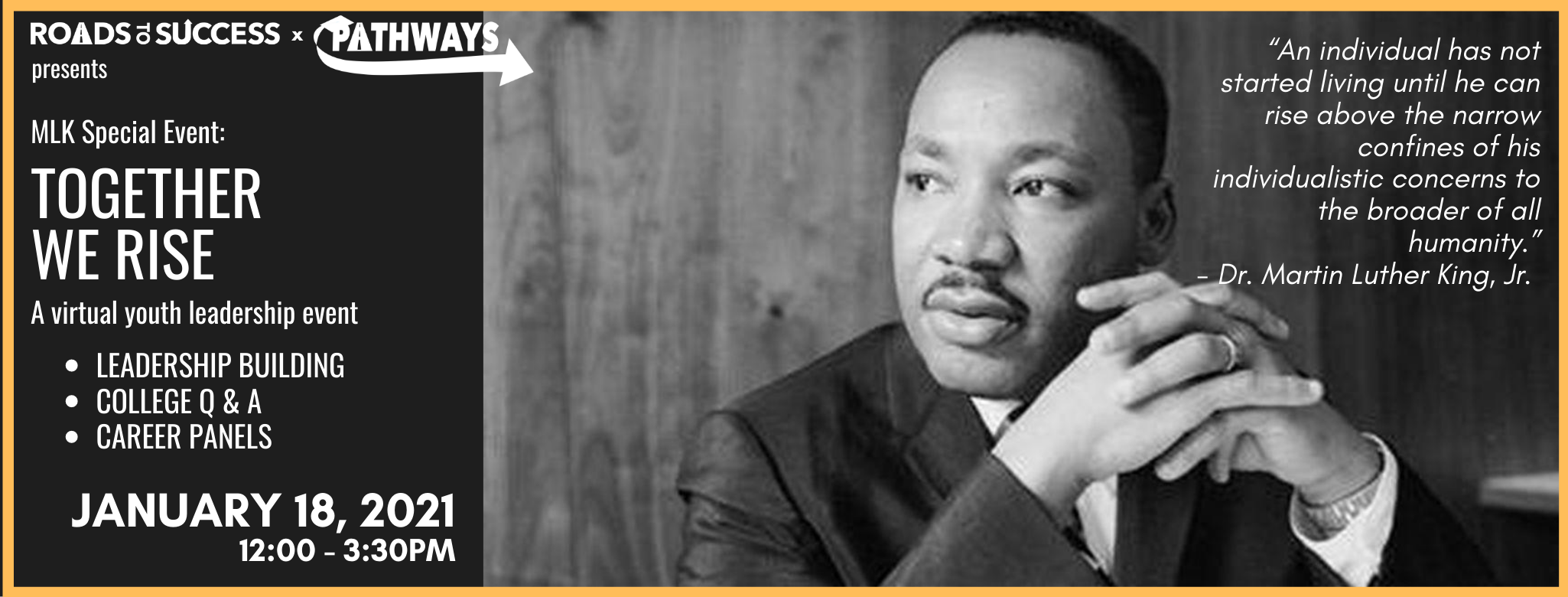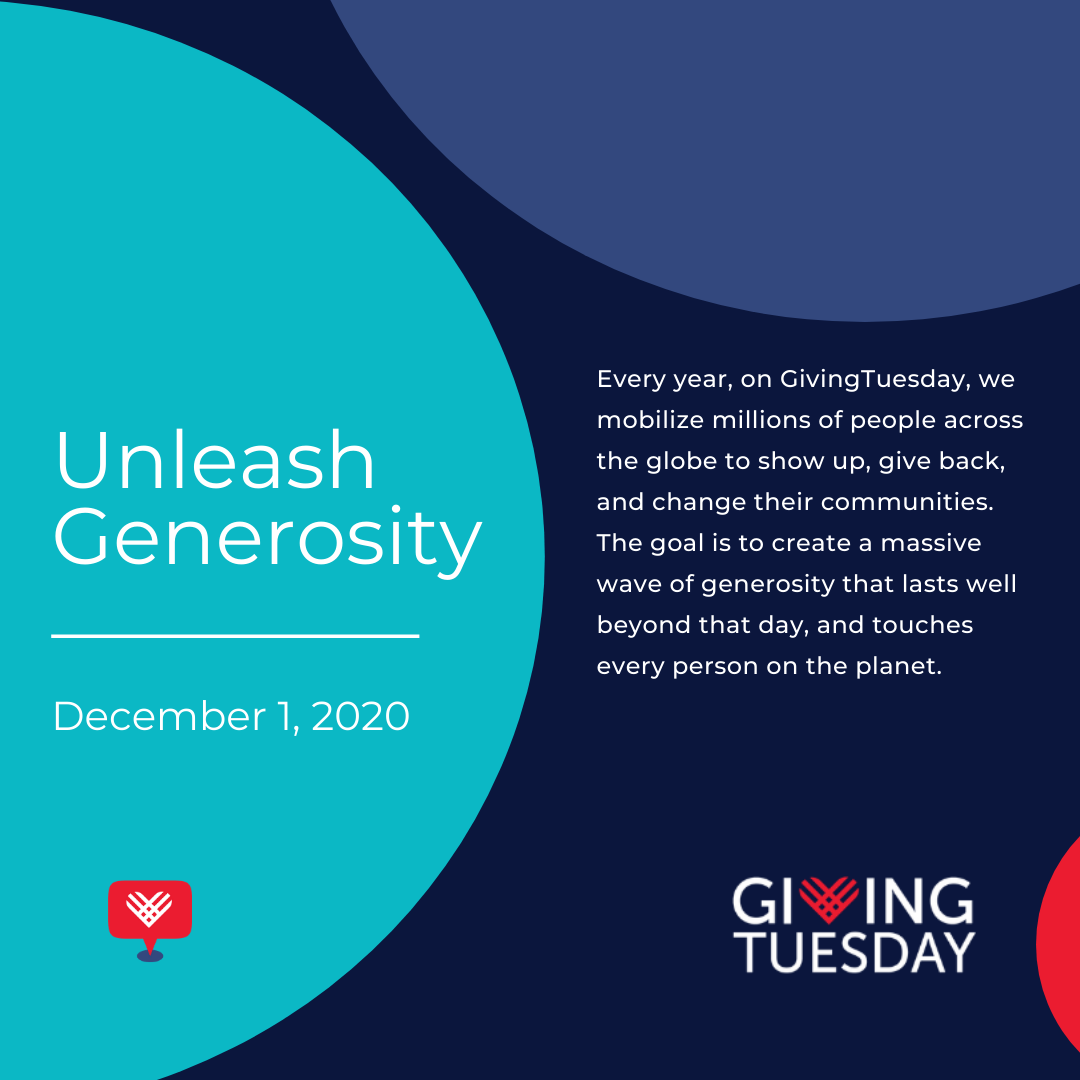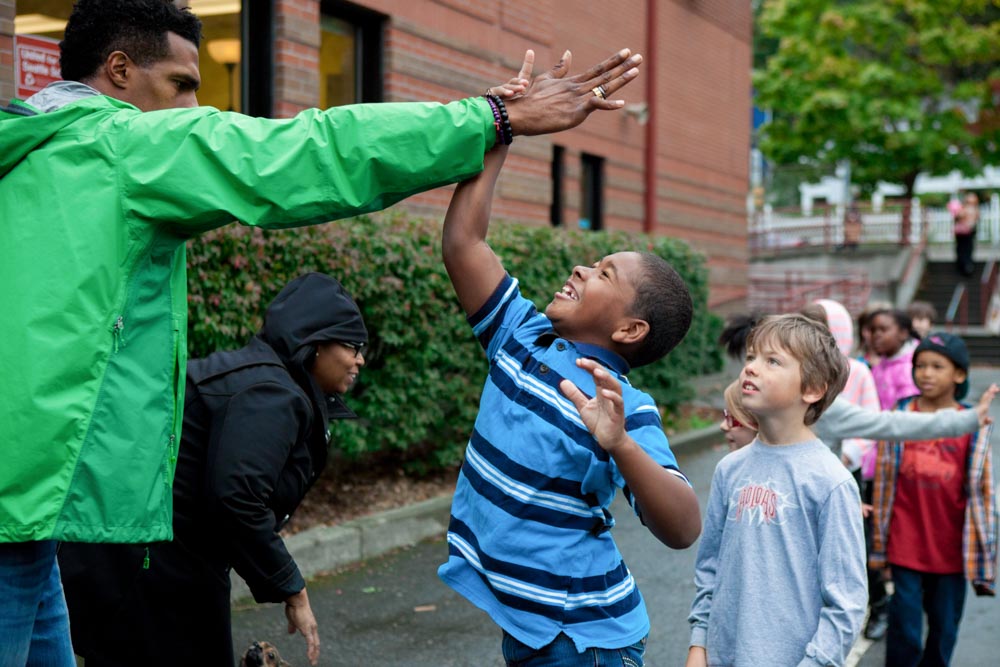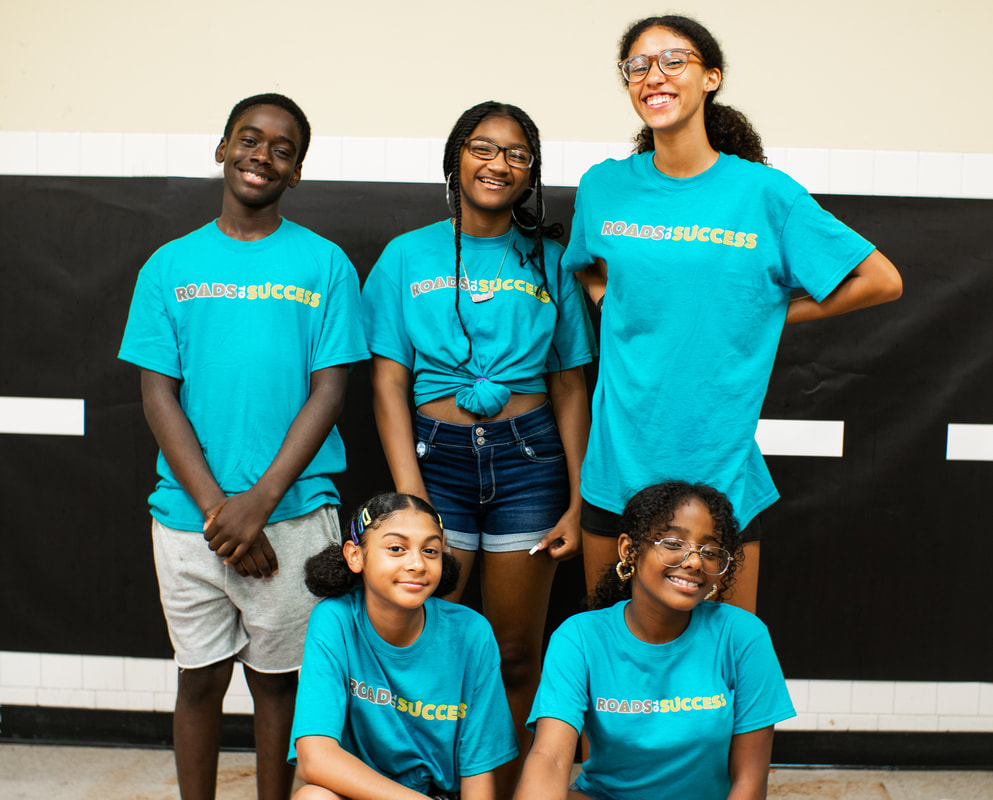Pathways
Donate
|
PRESS RELEASE
Keynote speaker Alexis Nieves, US Foreign Service Officer and special guest speaker Latchmi Gopal, City Council candidate for The Bronx (CD 15) will deliver addresses and answer questions from youth. The event will also feature:
Together We Rise will be held on Monday, January 18, 2021 from noon to 3:30 p.m. via Zoom. The event is free and open to all teens, young adults, parents and educators. Sponsorship opportunities available and will support empowerment programming for youth in neighborhoods affected by poverty. Please visit www.roadstosuccess.org/youth-leadership to register, or contact Kachina Respress-Pierce, Director of Education at kachina@roadstosuccess.org with any questions regarding the event including partnership and volunteer opportunities. About Roads to Success The mission of Roads to Success (RTS) is to inspire and empower all young people to take control of their future. Due to current events, RTS aims on improving the financial position of young people who have been most affected this year. Program offerings include after-school programs, summer camp, leadership conferences, youth employment opportunities, college access and career development. www.roadstosuccess.org ### Contact: Davis Connelly Director of Development (646) 205-7719 davis@roadstosuccess.org
0 Comments
Choosing a college is a very exciting rite of passage for many students at the end of their high school journeys. It is an important decision because it is where they will be starting their college career. The institution they choose will be where they develop a professional and personal network, begin their path to adulthood, and establish career and life goals. College tours are where many students experience a ‘wow’ factor during the application process. For many, the atmosphere on a college campus helps determine if they see a place for themselves in the community.
However, the option to tour college campuses (in-person) came to a screeching halt in March. Admission offices across the country scrambled to cancel tours and offer more information online to prospective students and their parents. As the fall semester begins for many college students online, admission counselors are also delivering an alternative to in-person campus tours. Virtual campus tours are becoming a part of the new standard for college admissions to produce. Some tours are even 360-degrees, to give students an expansive look at a college or university campus. Some institutions are going even further to demonstrate to potential students that their institution is the right fit by scheduling virtual meetings between high schoolers and current students, admission staff, and faculty. For instance, Yale has Zoom presentations; Vanderbilt University in Nashville is offering virtual coffee meetings, and University of Virginia has virtual dormitory tours. Furthermore, students can research student life at various campuses through YouTube videos or on independent sites like campusreel.org, which features short, vetted videos from students from 320 colleges and universities focusing on various aspects of student life.a Although face-to-face tours are more valuable to some students, there are perks to virtual tours which will keep the trend going after the pandemic. Virtual tours are convenient, time-saving, and cost-beneficial. You can visit different states and take multiple tours without leaving the comfort of your home. Roads to Success and Pathways will be holding a special virtual youth leadership event for teens on January 18, 2021 in honor of Martin Luther King Jr. Day. Together We Rise will feature a college panel, career panel, and leadership challenge for participants. Learn more and/or register for this event. From now until December 8th, Roads to Success is kicking off the holiday season with Giving Week - a week dedicated to rallying our community to take action and close the equity gap for young people striving for success. Because our young people have been faced with so much uncertainty recently, they are in need of reliable access to resources that support their continued growth and education - but we need your help. As a non-profit, our funding is not guaranteed and depends on the generosity of our supporters who believe that young people deserve an equitable chance to succeed in education, career, and in reaching their full potential. There are a number of fun and easy ways that you can support our youth, even if you are unable to make a donation yourself. Read below for ways you can participate in Giving Week.
To create a fundraiser on Facebook: 1. Click on 'Fundraisers' in the left menu of your News Feed. You may need to click 'See More.' 2. Click + Raise Money. 3. Select Nonprofit or Charity. 4. Select Roads to Success and fill in the fundraiser details and choose a cover photo. 5. Click Create.
For the past 4 years, Roads to Success has partnered with Youth Inc. to hold our annual benefit Fall Gala. This year would've been the first year that we held our own, independent gala, but unfortunately due to Covid, we had to postpone our inaugural event. More importantly, we were unable to raise funds on the same scale as a gala to support our program to its full capacity.
As a non-profit, our funding is not guaranteed and depends on the generosity of our supporters who believe that young people deserve an equitable chance to succeed in education, career, and in reaching their full potential. Our in-person and remote programs have kept young people engaged with their peers and mentors, provided access to social emotional support during this difficult time, and allowed parents to go back to work. However, there is still more that we can do. Although we can’t celebrate in person with you this year, we invite you to join us next week for Giving Week at Roads to Success. Starting on Monday, November 30th, we're taking our #BuildRoads campaign and Giving Tuesday a step further and rallying our community for one week to take action and close the equity gap for young people striving for success. There'll be numerous opportunities during the week to show your support including our #BuildRoads For Youth online auction that you can start bidding on right now! As we continue to adapt to this pandemic and try our best to keep our youth focused on their futures, your support is even more critical as we continue to provide the resources our young people need because they deserve an equal chance to get ahead, no matter their background. Thank you for stepping up on behalf of our youth.
Pathways is centered around Roads to Success’ pre-existing, guided curriculum. This successful, widely-used curriculum is downloaded and facilitated by hundreds of educators around the world every year for youth ages 12 and above. “This curriculum has been downloaded and used all over the world for years, but to offer it with a virtual learning service was a major priority, especially given the importance of remote learning now. There is so much debate and outrage in this country about equality, but this is how it gets done: empowering the young people to create their own future for themselves. We're excited to put this forward right now," says Bashan Fernandez, Chief Program Officer at Roads to Success. As the pandemic has shifted classroom learning entirely to the digital space or a blended model, Roads to Success has found new ways to help educators to implement this curriculum:
“Never in a million years did any educator believe when they left school in March that they would still be in an online learning scenario today,” says Melissa Silva, who teaches at Arts HighSchool in Newark, New Jersey. “We’ve had to learn new skills overnight, adjust to new procedures and adapt to our student needs. It hasn’t been easy but in true teacher style, we have pulled through and have come out stronger than ever. What we must now focus on is not merely just surviving this epidemic but thriving in it. To do this, we must as educators create quality educational opportunities and also perhaps more importantly, address the trauma our students have endured.” For more information on Pathways and to find out how you can sign up for a subscription, visit pathwaysbyroads.org. ### About Roads to SuccessRoads to Success empowers youth by providing them with mentors and resources that will support their own unique growth. We envision a future where youth from all backgrounds are given a fair and equitable chance to be inspired, connected, and to discover their own path to thrive. www.roadstosuccess.org For media inquiries, please contact:The SYEP Summer Bridge program was the City’s virtual solution to the Summer Youth Employment Program (SYEP) which was canceled for the summer of 2020 due to COVID-19. The newly designed virtual program gave youth a unique opportunity to explore their interests and discover new ones through project-based learning and career exploration activities on relevant themes such as civic engagement, community service, public health, etc.
Roads to Success enrolled 640 participants between the ages of 14-21 and partnered with worksites including The Metropolitan Equestrian Team, Join the Bloc, GrantAnswers and Student Dream. All participating youth used Hats & Ladders, a digital platform that facilitated a remote work-readiness experience, and engaged in digital self-guided as well as live instructor-led project based learning to complete a community action project. Participating youth ages 16 and over were also given a Workplace Challenge project where they were placed in small groups and given the task of coming up with solutions to a real-world problem or a challenge issued by a partner worksite. At the end of the 5 weeks, the groups presented their research findings and made recommendations to their respective worksite. Challenges addressed various issues including digital marketing, mental health in the workplace, product development, financial literacy and many others. “My participants have really grown into burgeoning young professionals. They’re examples of what real world professionals should be – they are collaborative, communicative and curious,” stated Patricia, one of the Success Coaches who worked directly with youth on their Workplace Challenge projects. Thank you to all of our worksites who gave our young people this great opportunity to learn within a real-world setting and congratulations to all of the participants who worked hard this summer and had amazing presentations. SYEP Summer Bridge took place from July 27 – August 28. Due to the downsized reach of the program, Summer Bridge prioritized low-income, justice-involved, foster care, runaway and homeless, NYCHA residents and young adults from high need neighborhoods, including those that have been most severely impacted by COVID-19. Protest all you want; the real change happens here.
1. Social emotional learning has economic benefits
Effective youth programs such as summer camps and after-school programs initiate significant gains in a child’s social emotional learning (SEL). Not only does SEL increase a child’s intangible skills such as self-confidence, self-management, and teamwork, but numerous institutions have pointed to studies suggesting that there are long-term economic benefits, with recipients staying out of trouble and earning higher wages in the long run. Studies conducted in connection with Columbia and Penn State Universities have estimated that for every $1 dedicated to effective SEL programs, the return on investment is between $11 - $21 in long-term benefits to students, schools, families, and communities. This is likely a result of reduced crime rates and public assistance service needs, combined with higher employment rates and tax revenue. 2. Youth employment programs are critical A known drain on America’s economy has been that millions are unemployed, yet we have a major gap in sectors like health care, education, and information technology, leading to many American companies struggling to compete globally. This is called the “middle skills” gap and it is remedied through training and opportunity after high school but before a bachelor's degree is earned. In addition, as recently noted by a New York Times article, participation in entry-level job programs such as NYC’s Summer Youth Employment Program not only led to “better self-esteem and academic accomplishment,” but also that it “found that the young people who applied but did not get selected were at greater risk of incarceration or death." 3. Mentoring pays forward No effective youth program is complete without the great role models who mentor our young people. Children remember the names of their favorite counselors and teachers long after attending, and as MENTOR: The National Mentoring Partnership notes, “disadvantaged youth who have had a mentor are 130% as likely to hold leadership positions, 55% more likely to enroll in college, and 90% more likely to become a mentor.” What these programs represent is equity, an attempt to alleviate deficits in society’s fairness. That could mean helping little kids in the South Bronx learn how to read – literacy is power. Asking firefighters, union delegates, salon owners, podcasters, photographers to speak to kids in East Harlem – mentoring is contagious. Putting a kid from Brownsville in a life-altering internship that inspires them to choose a major and look for scholarships – fascination is a currency. “Policing” communities that are under-resourced, under-represented, and perpetually underestimated is tantamount to putting a band-aid on a broken leg. Although people want to protest, donate money to bail out other protesters, and support memorial funds, we simply cannot afford to raise the bare minimum on education, mentorship, job readiness, college access. If we do, we will be right back shouting in front of City Hall, heartbroken over more incidents that showcase glaring inequities for years to come. There are dedicated institutions whose mission and outcomes support the very building blocks to a prosperous trajectory for young people, particularly those in communities vulnerable to systemic cycles of poverty and racism. And despite any progress that may come out of current calls-to-action for institutional reform, no progress can truly be made without our entire communities donating anything they can, be it small contributions, large donations, or simply spreading the word. So go ahead and black out your profile picture for a few days for #BLM, repost articles, give money to someone running against your least favorite congressman if you care to. But now is the critical time to ask yourself… which youth charity will you support? The Roads to Success team is making an impact on traditional education through project-based and social-emotional learning. Through after-school programs, leadership summits and camps, and summer job placements, we are using these learning techniques to create a long-lasting impact on our students. Here are 10 ways Roads to Success is making an impact. 1. Our philosophy of self-discovery By effectively adopting the social-emotional learning (SEL) style, students learn to develop the skills to manage their emotions, build positive relationships, make safe and responsible decisions for themselves, and handle challenges constructively and ethically. Research has shown that social-emotional skills are critical to success in school, work, and life. Furthermore, project-based learning engages students to learn and develop skills and knowledge over time using problem-solving skills in real-world situations. This is achieved through research, collaboration with others, and presenting their work and findings along the way. As a result, students are empowered by their efforts and have autonomy over their work. 2. We are committed to building community connections Through our partnerships with 21 public schools and after-school programs, we have been able to serve 5,188 youths throughout New York City. In 2019, Roads to Success reached twice the number of students than the year before. 3. Our vision to provide access We are determined to create and provide access to academic and professional opportunities for all New York City youths regardless of socio-economic status. 4. Creating economic wealth in the community According to Columbia University’s research studies (Center for Benefit-Cost Studies in Education Teachers College, 2015), the benefits outweighed the costs of our SEL-focused programs. For every $1 donation to effective SEL programs, like Roads to Success, the return on investment is $11 in long-term benefits to students, schools, families, and communities. Furthermore, our program facilitates financial literacy workshops for NYC students. 5. Establishing a safe environment Our programs help lower crime, lessens risky behavior, addiction, and the need for public assistance. Also, our summer job employment program and college access programs create higher employment, thus higher tax revenue in the community. 6. We encourage academic performance Our approach to a growth mindset, is the idea that intelligence can grow and be developed through hard work, positive strategies and support from others. We believe in motivating students to embrace challenges, learn from criticisms and setbacks and find inspiration and lessons in others’ success. By promoting a growth mindset, our young people believe they can achieve their goals and will work harder to achieve success. 7. Jumpstarting students’ futures through higher education There is a college-going culture at Roads to Success, Despite academic grades and assessments, we explore post-secondary options with all students. We know that youths exposed to college and vocational school options at an early age understand the purpose of doing well academically and they can access through hard work. Roads to Success facilitates college visits to Yale University, as well as, a college and career fair at the annual Leadership Summit. 8. We embrace new experiences RTS after-school program with Ballet Hispanico exposes youths to Latin culture through traditional dance instruction. Our partnership with US Soccer Foundation and DYCD gives students access to soccer lessons and games developing team building. Our newest program, the Summer Youth Employment Program (SYEP), has partnered with 52 organizations to give youths the opportunity to learn about new career paths. One of those organizations is the Metropolitan Equestrian Team (MET). MET is a nonprofit headquartered in Brooklyn. In summer 2019, SYEP youth were tasked with projects that would help develop the Equine Opportunity Program, which brings horseback riding opportunities to children regardless of socioeconomic status. The SYEP team researched and presented on ten nonprofits across the US that they felt would benefit from equestrian sports. As a direct result of the work performed by the SYEP youth, the Equine program quadrupled in under a year and expanded to cities across the country. 9. Cultivating leadership Our program hosts events that encourage student leadership personally, professionally, and within their community. Such as the Leadership Retreat at Camp Jewell and MLK Day of Service with State Bags at M.S. 57. Since 2013, RTS has partnered with the Country Roads Foundation to run Camp Power, a weeklong leadership program in the Poconos for 200 youth from targeted, under resourced NYC neighborhoods. While campers range from ages 10 to 18, the16- year-old campers are selected for a CounselorIn-Training program, and 17 and 18-year-olds can be promoted to Junior Counselor interns. This project-based occupational experience is for those interested in being educators and youth workers. In 2019, 40% of the Camp Power staff were youth alumni who previously attended Camp Power as campers. 10. We Care Our core values can be summarized by the Circle of Courage. The Circle of Courage is a model of positive youth development based on four universal growth needs. It is important to us that our Future Leaders experience the values of Belonging, Independence, Generosity, and Mastery which are ingrained in every aspect of our programming. Our programs cultivate a welcoming environment made by caring individuals who provide support and a sense of community, ownership, loving others and being loved. We foster independence through youths making their own decisions and being responsible for failure and success based on their choices. Our team continuously practices showing selfless concern for others well-being and helping to sustain an environment where students are encouraged to practice and master skills in cognitive understanding in many areas of life.
At Roads to Success, we are adapting to a new reality. We are offering an alternative to in-person programs and events. Our after-school programs, summer camps, and events, such as the Leadership Summit, will be available to students online. Our team is committed to promoting and sustaining an environment for academic, personal, and professional development through out-of-school-time programs. Keeping students’ safety in mind as the world continues with the COVID-19 health crisis, parents and teens may want to consider online alternatives. We have compiled a list of 5 awesome job opportunities for every type of student. The summer of 2020 in New York City looks extraordinarily different from past years. Our city was often used as an example and compared to many other states and countries around the world adapting to a global pandemic. As businesses started to slowly open, safety remained the topic of heavy debate. Not only are adults coping with the shortage of unemployment, but students also found themselves without a summer internship or a job opportunity as planned. The Actor For teens who love theater or are interested in broadcasting, we suggest working as a voice-over actor. This is a cool way for those interested in acting or entertainment to find part-time work and learn about the industry from the comfort of home. Teens as young as 13 can register with Voices.com as long as parents or legal guardians manage the account and agree to comply with the terms for keeping kids safe online. The site is free and connects actors with clients. Voice-over actors can find work doing commercials, podcasts, video games, and radio. The rate per project will vary; however, it is a fun opportunity for self-discovery with a diverse set of genres. The Music Lover Do you enjoy listening to and discovering new music? We found your ideal summer job! Become a music reviewer starting at age 13 for a website called, Slice of Pie. This platform allows you to review songs, which ultimately helps artists, record labels and brands make important decisions on the content they created. The more helpful your review and your overall-star rating will determine how much you will earn. For example, a 1-star reviewer earns $0.03 per track review, while a 5-star reviewer makes $0.15 for each track reviewed. You can collect payment via PayPal once your account has a minimum of $10. For younger teens, parents should monitor what their kids are reviewing The Writer If you love writing, why not start a blog! During the summer, would be the perfect time to start building your writing portfolio. Become a freelance writer for clients at age 13 using Fiverr for age 18 using Upwork. You may be great at catching other people’s mistakes or more comfortable with translating or transcribing. In which case, you would make an excellent proofreader/editor. Jobs on Fiverr are referred to as ‘gigs,’ and you can write or edit for blogs and businesses on your schedule. The Artist Harnessing your skills with design software and programs like Adobe InDesign and Photoshop? Why not start working as a graphic designer for sites like Redbubble and Society6? You can upload your designs to these sites that you can then sell on coffee mugs, pillows, and stickers On Society6, designers can earn about 10 percent of the retail price while the average artist on Redbubble earns 17 percent. You must be at least 16 years old to use these platforms. Don’t be shy to market your work independently on social media to get more sales. This is a chance to express yourself. Being a graphic designer means creating eye-catching imagery to reflect a brand, company, or your ideas. Go brainstorm! The Organizer
Are you the type of person who enjoys talking on the phone? Are you internet proficient or comfortable with different project ways of project management? If so, working as a virtual assistant could be the perfect fit for you! Virtual assistants respond to emails, conduct research, handle general social media management, and more depending on the client’s needs. A client may ask you to work on a needed-basis or for a set number of hours. A virtual assistant can work for a company or as a solo entrepreneur. You can manage how often you work, your rates, and if you will take on more clients. This is a great opportunity for a problem-solver looking to learn new skills. Students age 13 and older can use platforms such as Fiverr, Instagram, and Facebook. However, you must be 18 to use Upwork. Roads to Success’s mission is to help young people find their identity and build their independence through personal and professional development outside of the classroom. Summer break is coming to an end and many teachers and parents are faced with the reality of homeschooling this fall. As an educator, you may feel overwhelmed to create a schedule/routine for your young learner. You are not alone! The first thing to remember is that every homeschool is different because every family is different. Typically, homeschoolers do not fit into an 8-hour day model. Public school often requires a lot of crowd control time which does not exist in the homes of students. So how long should structured learning (aka direct teaching or independent/small group work) be? Suggested Timing: Pre-school - 15 to 20 min Kindergarten - 30 min to 1 hour 1st to 2nd Grade - 45 min to 1.5 hours 3rd to 4th Grade - 1.5 to 3 hours 5th to 6th Grade - 2.5 to 3.5 hours 7th to 8th Grade - 3 to 4.5 hours Highschoolers - 3.5 to 6 hours When it comes to the order of your curriculum schedule, you will have to find out what works best for your students. For example, it has been found that starting the day with Math helps the day go faster. However, that approach may slow your young learner’s day down afterwards. Student’s retention of information after learning is important. That is why structured learning combined with interactive activities is a great way for students to practice the lessons they are learning. By lessening teacher talk time and focusing on a student based approach, your student will gain a better connection to the lesson plan and an understanding of the material. Furthermore, engaging students using project-based learning helps cultivate a growth mindset environment through research, collaboration, and presentation of their work. Students are empowered by their efforts and take ownership of their projects as a result. At Roads to Success, we believe in having a growth mindset and teach students the idea that intelligence can grow. Therefore, during lessons and extracurricular activities practice avoiding a fixed mindset.
This includes thinking or saying things like: “I am doing this wrong;” “I don’t know what to do;” or, “This will never change.” Rather practice positive strategies of support, such as: “I can do things that are challenging;” “Practice makes progress;” or “I am still learning and it’s okay. Next time I will focus on...” By promoting a growth mindset, your young people will believe they can achieve the amazing goals in your curriculum! |
About usGet involvedget social with us! |
|
© Roads to Success | 174 East 104th Street, 3rd Floor | New York, NY 10029 | 646-519-5050
Privacy Policy | Donor Privacy Policy | Webmaster | Contact Us
All rights reserved. Roads to Success is a 501 (c)(3) non-profit recognized by he IRS. Tax ID Number: 11-3599459
Privacy Policy | Donor Privacy Policy | Webmaster | Contact Us
All rights reserved. Roads to Success is a 501 (c)(3) non-profit recognized by he IRS. Tax ID Number: 11-3599459


